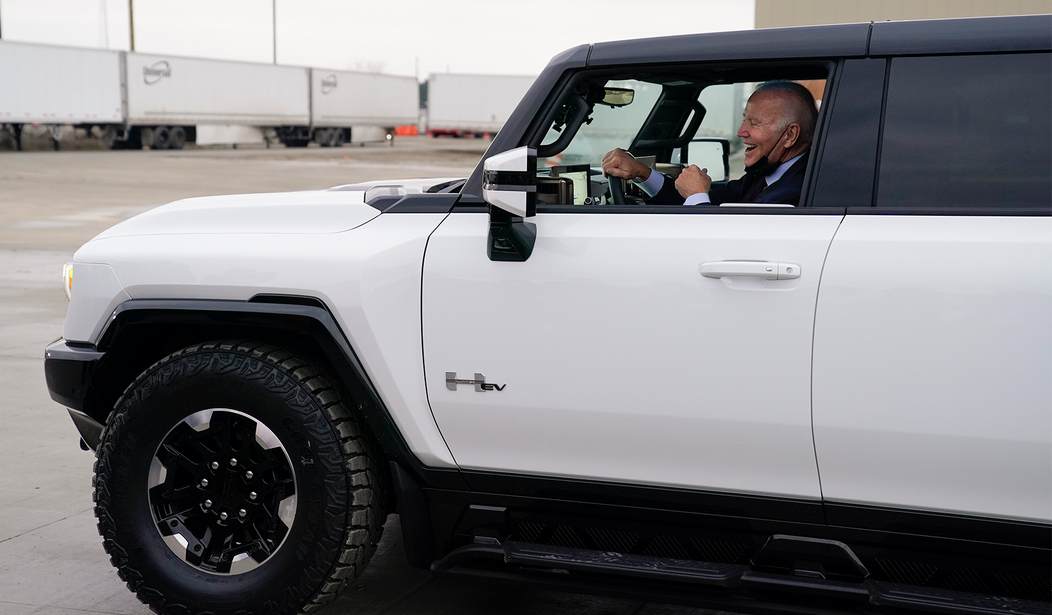The new vehicle emissions rules being proposed by the EPA will lead to 67% of all new car sales being EV’s by 2032, according to industry experts. The Washington Post reports that the rules will be “the most aggressive emissions restrictions on the auto industry in U.S. history.” Under the most stringent proposal, automakers would have to cut their emissions for passenger cars and pickups by more than half from the 2026 emission standards.
Cutting emissions so drastically will add thousands of dollars to the price of a gas-powered car. This is exactly what Biden wants. Electric vehicles cannot compete with gas-powered automobiles in many ways but especially in price. Even with massive subsidies, the average electric vehicle is $18,000 more expensive than a gas car and costs more to operate.
It will be a decade before electric vehicles are as efficient as gas-powered vehicles. But if Biden can jack the price of gas-powered cars high enough, he’ll leave Americans with fewer choices and make EV’s a more attractive choice.
“As a car enthusiast and self-proclaimed car guy, President Biden is seizing the moment,” the Post continued. “His Investing in America agenda is expanding domestic manufacturing and accelerating adoption of zero-emission vehicles, including battery electric, plug-in hybrid electric, and fuel cell electric vehicles.”
I thought Biden was a “train guy.”
Related: The EPA Plays Along With California’s Attempts to Ruin the Supply Chain
“The Biden administration is trying to bend every federal rule they can find to force people into buying EVs,” said Myron Ebell, the director of the Competitive Enterprise Institute’s Center for Energy and Environment. “There is still a market that allows drivers to buy the vehicles of their choice, but government coercion is rapidly limiting those choices.”
“If Biden policies are successful, we will soon have a choice between buying an EV and not being able to afford a vehicle at all,” Ebell added.
Overall, the average cost of an EV was $64,338 while the average cost of a compact gas-powered car was $26,101 as of last year, according to Kelley Blue Book. In addition, the Department of Energy reported that the average range of model year 2021 gasoline vehicles was 403 miles compared to the median 234-mile range of model year 2021 EVs.
And Republican lawmakers also blasted the rule after it was first reported by various news outlets last week.
“Yet another draconian rule from the Biden Admin,” Rep. Dan Newhouse, R-Wash., said. “From gas stoves to vehicles, their anti-American energy policies put our nation on a dangerous path. It’s time for the government to stop over-regulating our lives and protect our energy independence.”
Biden's radical EPA is trying to regulate your car's engine into OBLIVION.
Enough energy fantasies. @HouseGOP MUST use the power of the purse to END the weaponization of the federal bureaucracy.
Slashing EPA's funding should be at the top of the list.https://t.co/oBVo6Ce56N
— Rep. Chip Roy Press Office (@RepChipRoy) April 10, 2023
One of the biggest roadblocks to Biden’s plan is that electric charging stations are nowhere near as prevalent as gas stations. There are currently 168,000 gas stations in the United States and 164,000 miles of highways in the national highway system. The entire highway system was built with the gasoline engine in mind.
How many charging stations will be needed?
The Biden administration is building up America’s electric vehicle charging station infrastructure, most recently with the Department of Transportation approving plans to build charging stations in all 50 states. This move is part of the bipartisan infrastructure legislation passed late last year. These charging stations will cover roughly 75,000 miles of highways—nearly half of the highway system. The ultimate goal is to have 500,000 new charging stations by 2030.
Still, financing the switch to a cleaner transportation system across the country. Where the stations will be placed, how increased demand for charging will be handled, and coordinating other types of transportation will be crucial to getting an EV-focused highway system up and running.
There are also questions about whether the power grid can be built up fast enough to handle the extra load. And this radical change is not going to be welcomed by the American people. According to a Gallup Poll, only 4% of Americans own electric vehicles and 12% are “seriously considering” buying one. Forty-one percent would not buy an EV while 43% “might consider” buying one in the future.
And most Americans don’t accept that EVs help fight climate change.
Yet, this idea that electric vehicles help to address climate change is not universally accepted by Americans. While about four in 10 U.S. adults think using EVs helps address climate change “a great deal” (12%) or “a fair amount” (27%), roughly six in 10 believe it helps “only a little” (35%) or “not at all” (26%).
If climate change is as urgent a crisis as many greens would have us believe, all of this would be immaterial — it’s too late and we’re all going to die. If that’s the case, give me back my V-8, throw my catalytic converter in the garbage, and drill, baby, drill.










Join the conversation as a VIP Member